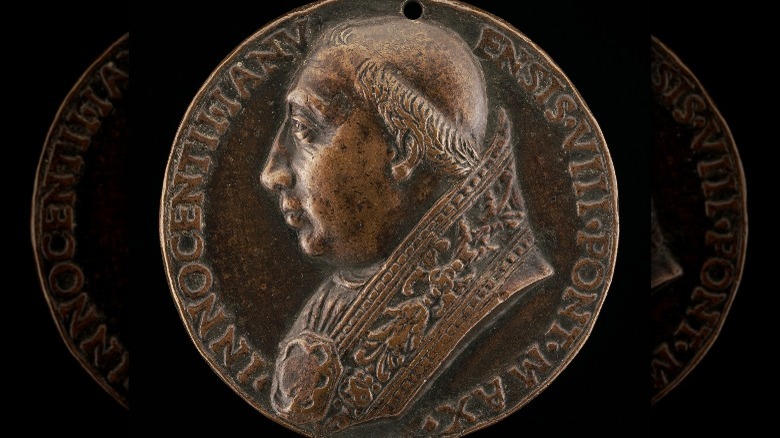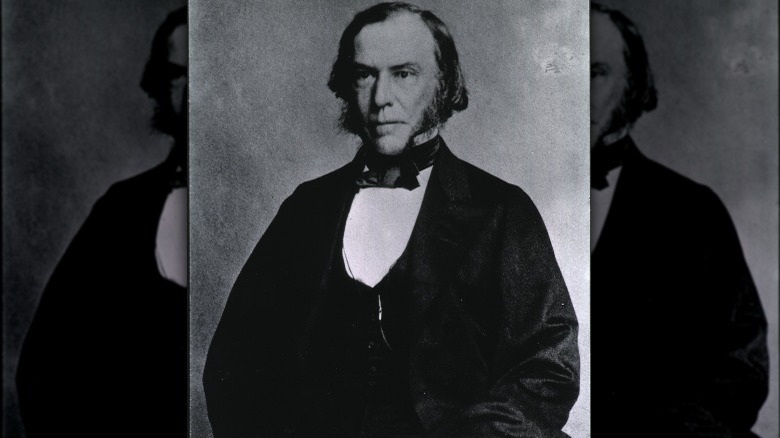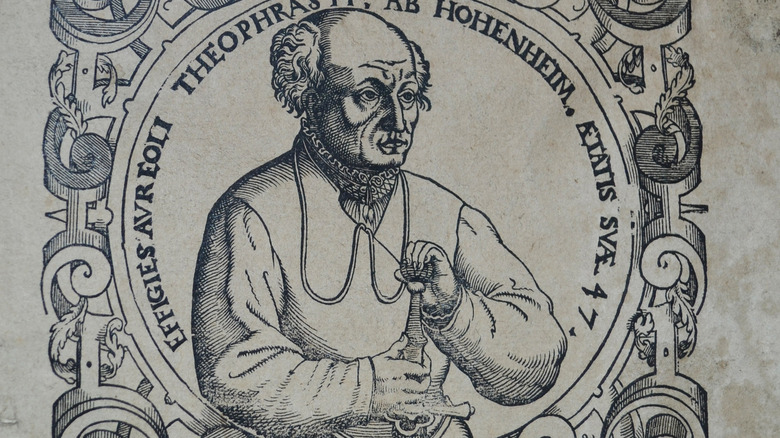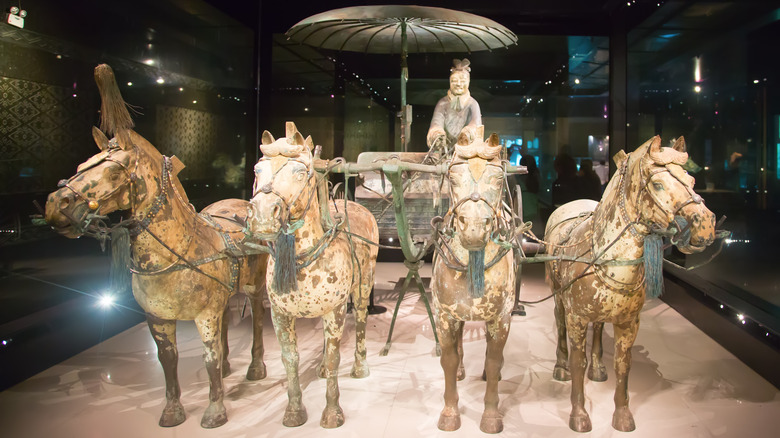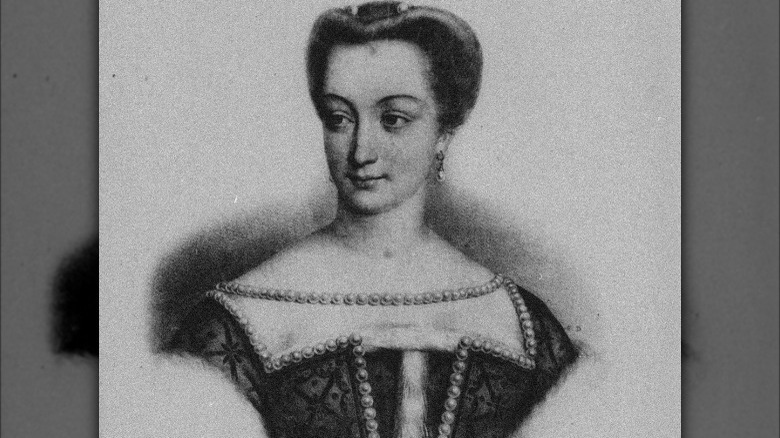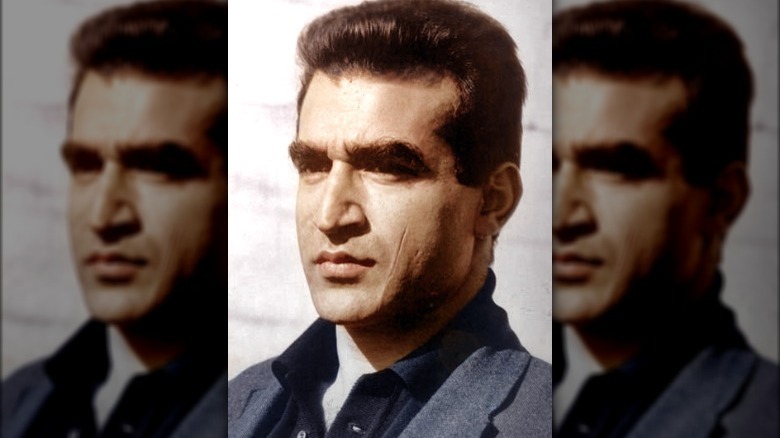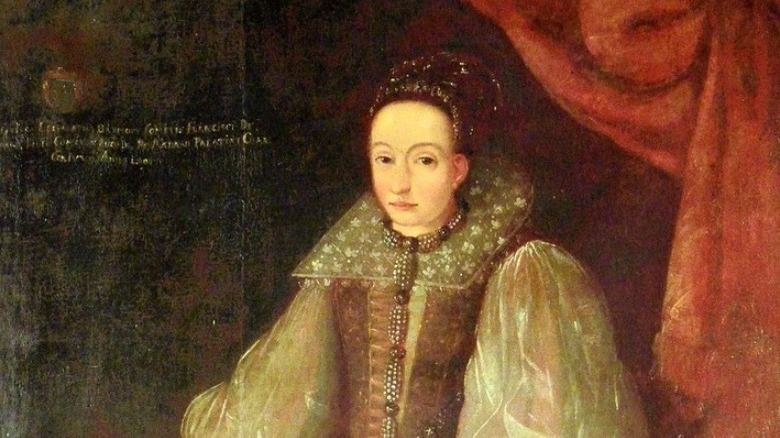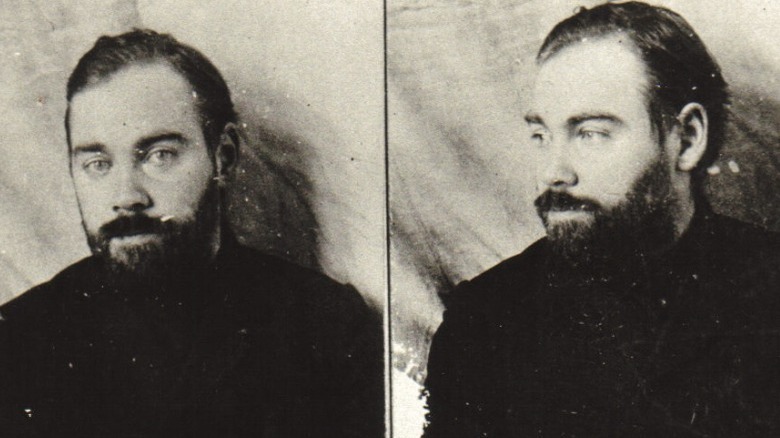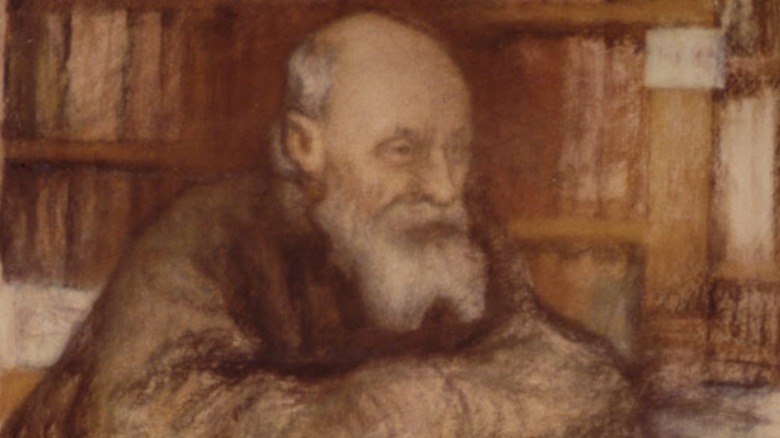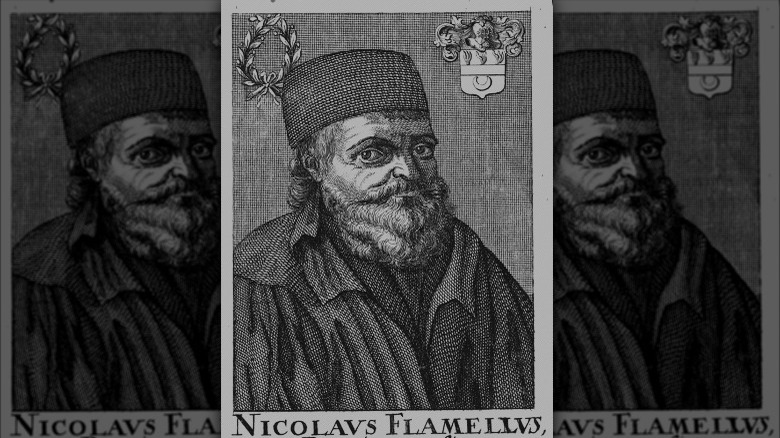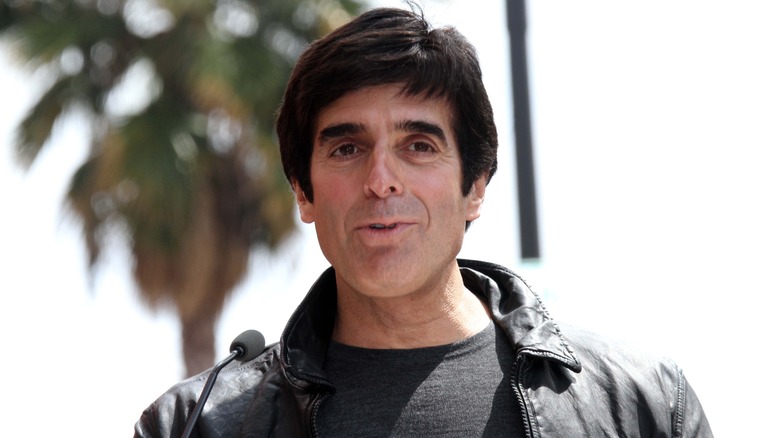The Strangest Attempts At Becoming Immortal
As long as humans have been alive, they have also died — a notion that Francis Bacon summed up pretty well when he said, "It is natural to die as to be born." There's an inevitability to death, but even still, humans have tried to avoid it by trying to be physically and mentally healthy, by investing time in science and medicine, and by achieving harmony with the spiritual realm. There will never be a shortage of human ingenuity seeking to prevent the inevitable.
So is it all that crazy to think that the human mind can create a solution for death? While there have been advances, nothing has deterred it forever, and even those advances haven't proven foolproof. Not to get too morbid, but death is kind of random at times; it can come from anywhere.
That's getting into the unnecessary details of life and death, though. At its simplest, the quest for immortality is easy to define. Here are how some of the best and brightest, and also the cruelest, have pursued eternal life throughout history and into the present.
Pope Innocent VIII
There have been a lot of attempts at becoming immortal through the use of blood, usually other people's blood, and usually those other people being much younger and/or healthier than the person receiving said blood. That's what Pope Innocent VIII had in mind when he decided that he wasn't really in the mood for death, at the moment or ever.
According to G.A. Lindeboom's aptly titled article, "Story of a Blood Transfusion to a Pope," Innocent VIII, like many other popes of the time, did not live a very chaste life. He had a bunch of illegitimate kids running around, most of which he gave high-ranking positions to in a classic case of nepotism. Obsessed with his own wealth and power, he got a bit worried when his health started to decline and decided that the time was nigh to beat death once and for all.
After suffering a stroke that nearly killed him, he made the call for immortality via a rather cruel and unconventional means. He summoned three 10-year-old boys and had their blood transfused into his body, becoming, unfortunately, the first historical occurrence of a blood transfusion, according to Seeker.
Sadly for the three boys, they died during the process. Deservedly, so did Pope Innocent VIII.
Charles-Edouard Brown-Sequard
Charles-Edouard Brown-Sequard had himself a fantastic reputation in the medical field during the mid-to-late 19th century. He advanced the medical world's understanding of the connection between the nervous system and the brain, as well as the use of bromides to treat epilepsy, and the effects of the adrenal gland extract, according to HemOnc Today.
Given his reputation, when Brown-Sequard had an idea, people generally listened. Even when, at the age of 72, he made his boldest claim yet — that he had discovered a secret in the field of longevity. This secret, according to HemOnc Today, was the use of testicular blood and extract and seminal fluid from guinea pigs and dogs. The aging man of science claimed that by injecting those things into himself, he felt 30 years younger, could run up and down the steps, and lift heavier weights.
While research is still ongoing in this relatively new medical field, guinea pig testicles did not save Brown-Sequard's life. He died four years after the presentation.
Paracelsus
Paracelsus was a Swiss-born man of science and medicine, according to Britannica. His extensive resume includes alchemist, physician, botonist, and philosopher. He also happened to exist at a time when a rather particular and gruesome practice was gaining in popularity in the field of medical diagnosis and treatment — cannibalism.
Only, this cannibalism applied to the consumption of dead people and their various bits and pieces, mummified being preferred. As Science History details, Paracelsus himself concocted numerous medicinal recipes meant to cure different ailments, with dead flesh and bone the central ingredient. For instance, one recipe included the "unburied skulls of three men who died a violent death." He himself wrote, "Of Mumy only is made the most excellent Remedy against all kinds of Venomes."
The most telling quote from Paracelsus lays out his entire belief system. "What upon the earth is there of which its nature and power are not found within the human being? ... For all these great and wondrous things are in the human being: all the powers of the herbs [and] trees are found in the mumia." Essentially, everything the human body needs can be found in someone else's dead body, and those needs could be transferred from person to person, thus prolonging life itself. In theory.
Qin Shihuang
Emperor Qin Shihuang may well be the most famous historical figure to have pursued immortality. But his reasoning for doing so goes all the way back to his childhood. He was terrified of death from a very young age. To safeguard himself, he began construction of his elaborate tomb at the age of 13, thus securing that in death, he would be well taken care of, according to Khan Academy.
After his success in unifying China for the first time in history, he determined to find the elixir of life and sent word to all the towns and outposts throughout his kingdom, instructing his regional rulers to find the elixir for him, according to Lapham's Quarterly. Many wrote back that they could not find it, or that they would certainly look, but no one came forward with that vital concoction.
Eventually, some of the emperor's scientists put together a mixture that they believed might do the trick. The potion had, among other things, a high concentration of cinnabar, which is mercury– the toxic chemical that shines like silver. Keep in mind this was long, long before the days of medical intelligence, so the effects of consuming it would not have been known — but the effects were soon found out. At 50 years old, Qin Shi Huang died, a victim of his own immortality elixir.
James Schafer
James Schafer was something of an odd duck. All you need to know about his character is summed up in TIME Magazine's opening line about him from December 30, 1940. "Handsome, fiftyish James B. ('The Messenger') Schafer has a simple rule of thumb: 'When you serve people you create obligations. Then the money comes in.'"
He also claimed to have various supernatural powers, according to Mysterious Universe, including mind reading, being a healer, and being able to make objects disappear. But wait, it gets better.
Founder of the Royal Fraternity of Master Metaphysicians, Schafer created a plan to unlock the secrets of immortality, beginning (and ending) with eating a lot of vegetables and not having bad thoughts — he called it the "Eternity Diet." To prove his point, Schafer adopted a three-month-old baby, Jean Gauntt, with the intention of feeding her nothing but vegetables and good thoughts. If all went according to plan, she would never die.
After 15 months, baby Jean's mother, who had been too poor to take care of her baby at the time, decided that cult business just wasn't right and demanded her baby back. Since it wasn't a legal adoption in the first place, there was no case for Schafer. He was convicted two years later for grand larceny.
Diane de Poitiers
Diane de Poitiers was a favored mistress of the French King Henry II. In fact, she was so favored that, according to Britannica, she was practically the queen, even if not officially in name, with Catherine de Médici, the actual queen, pushed to the side. While de Poitiers was 20 years older than Henry, he had fallen hard for her from the moment he met her, and thus began her role in his court.
Her sharp mind and ambition made her part of just about every prominent crowd in France, from poets and thinkers to scientists. All of which contributed to her unchallenged stay among the various courtesans and nobles, granting her access to the most cutting-edge medical practices of the time — practices that might well extend long life (but actually probably killed her). That practice was the consumption of drinkable gold.
According to NPR, drinkable gold back then was the equivalent of pomegranate seeds now — a life hack of longevity. While it wouldn't have been known at the time of her death that this was the cause, a posthumous investigation revealed deadly amounts of gold in her hair, indicating that she likely drank so much of it in an attempt to stay young, that it ended up doing the exact opposite.
FM-2030
Born as Fereidoun M. Esfandiary, little is known about who FM-2030 actually was because, according to the New York Times, he didn't subscribe himself of any age or nationality, instead referring to himself as a global entity. These things were constructs that held no practical value to the future of humanity. He was, after all, a futurist and believed in a time when none of those trivial facts would matter to anyone.
Transhumanism is a pretty modern concept that, according to VICE, is defined as using science to surpass biological barriers such as death. Esfandiary was one of the first to actively write about these massive topics still raging across discussions today. After writing a book about the outdated notions of things like capitalism, socialism, and nihilism, among others, he officially changed his name to FM-2030. The 2030 in his name was a reference to the year when he believed that society would come together, ultimately changing humanit.
He instructed on his death that his body be frozen, according to the New York Times, and that's exactly what happened. 2030 is just around the corner. Let's see what happens.
Countess Elizabeth Bathory
On the scoresheet of "who killed the most people trying to become immortal," Countess Elizabeth Bathory wins by a healthy margin. She killed so many people that she earned the rather unpleasant moniker "Blood Countess" and is also thought to have inspired Bram Stoker's "Dracula," according to CNN.
There's no use beating around the bush in regards to what she did — she bathed in the blood of virgins, thinking it would make her immortal. More specifically, she believed it stop the aging process. But only virgin blood, mind you, because nothing else would do.
After her husband died, she had something of a meltdown. The problem, given that she was born into highest society and ruled over a portion of what today would be Slovakia, was that she had relatively nothing holding her accountable. Which is how she managed to torture and kill between 100 and 650 virgins. When she ran out of impoverished virgins, she began luring high-born virgins to her castle, but the high-born parents started to recognize their children were missing — and they made a stink about it that was actually heard.
This, eventually, gave way to the Hungarian king finding out, promptly arresting Bathory and her three servants, burning the servants at the stake, and walling Bathory into a castle where she died — probably not with youthful-looking skin.
Dr. Anatoli Brouchkov
In 2009, Anatoli Brouchkov found something that he believed had the secret to eternal life because it may have had eternal life itself. It was an ancient bacteria called Bacillus F, which, according to Discovery, was frozen deep in the permafrost of a Siberian mountain.
All told, the rough estimate of age was 3.5 million years. This is amazing in and of itself, but even more amazing was the fact that it was still alive, undeterred by 3.5 million years of being buried in permafrost. Even more than its own ability to live, it may have also proven capable of extending the life of things it interacts with. According to the Siberian Times, the early studies conducted on the bacteria showed an effect on mice, fruit flies, and crops, leading to the belief that it may have a part to play in an elixir of life.
That said, scientists still don't fully understand what this bacteria is capable of — it's too new in the experimentation process. That didn't stop Bouchkov from throwing his immortality Hail Mary — he injected it into himself, and that was that. It hasn't killed him, so maybe it's working. Only time will tell.
Alexander Bogdanov
Alexander Bogdanov was something of a celebrity sensation in Russia. He was a science fiction writer, a doctor, and an early frontrunner of cybernetics, according to Gizmodo. There's even a famous picture of him playing chess with Vladimir Lenin himself.
In his fiction, Bogdanov wrote of a utopian society free of manual labor, where people exerted themselves to further the culture of society, or to think about all the great things that culture had become to that point. A man with such a strong vision of the future would certainly be hard-pressed to live to see that future, and for Bogdanov, the solution came from the field of hematology — the study of blood.
Thus began his experimentation in the field of blood transfusions. According to his own results, his eyesight improved, and his balding stopped, which naturally prompted him to keep trying to keep getting younger and healthier. After all, it was working, right? Unfortunately for him, he chose the wrong subject to transfuse his next batch of healing elixir (blood) from — the subject had malaria, and Bogdanov caught it and died. Oddly enough, the subject lived.
Nikolai Fyodorov
If there was an award for the most confusing way one tried to achieve immortality, Nikolai Fyodorov would take home the trophy. According to Atlas Obscura, Fyodorov was an early founder of the concept of "cosmism." He believed that death was not an inevitability, that it was merely a flaw and like all flaws, it needed a little correcting. This meant replacing every single flawed part of the body which, in the end, would mean every piece.
Fyodorov was also a pioneer of the Russian space system, because space played a part in cosmism as well. Adding to his philosophies, Atlas Obscura notes that Fyodorov sought to use humanity's best features — science, art, and technology — to create heaven itself.
All of this combined to form one really advanced philosopher whose way of thinking was way ahead of its time, considering that he was laying all these ideas in the 19th century. It was probably even too advanced for the present day. As far as achieving immortality, Fyodorov's most direct answer to the question was that humanity travel to space to gather the dust of previous generations. Which seems straightforward enough, right up there alongside replacing all of our organs.
All that said, he was right on the money with replacing defunct organs with good ones, which has lasted into modern science. Assembling long-dead ancestors from the cosmos ... maybe in a few years.
Nicolas Flamel
The one from Harry Potter? Yes and no. That whole bit about him creating the Philosopher's Stone was as historically accurate as it could be, though its powers are where the historicity tends to derail a bit. According to Atlas Obscura, it had the power to turn metal to gold, but it also had the power to extend human life.
There's a bit about this in an anonymous text, as found in Glenn Alexander Magee's book, "Hegel and the Hermetic Tradition": "all infirmities might be cured, human life prolonged to its utmost limits, and mankind preserved in health and strength of body and mind, clearness and vigour."
The stone itself casts a lot of confusion since no one can pinpoint exactly what it looked like, and it differed from case to case. Some said it was a yellow, heavy powder; others said it was a solid, dark, red, ruby-like object. Supposedly, Flamel was the only to have ever created the stone. After his death, his house was ransacked by people looking for it, as well as his other alchemical solutions and, unfortunately, the stone itself was never found.
David Copperfield
The Fountain of Youth remains the oldest reported source of immortality and the one that has led to the most expenditure. Ponce de Leon led a famous exploration in search of this fabled fountain, and so did Alexander the Great (via National Geographic). While none who looked for it ever exactly found it, someone else may have stumbled into it — and that someone else just so happens to be famous illusionist David Copperfield.
Copperfield bought a $50 million cluster of islands in the Bahamas and sure enough, right there under his nose was the fountain of youth itself, according to Today. While he hasn't said much about it, he did say to Reuters (via Today), "I've discovered a true phenomenon. You can take dead leaves, they come in contact with the water, they become full of life again. ... Bugs or insects that are near death, come in contact with the water, they'll fly away. It's an amazing thing, very, very exciting."
There are biologists and scientists examining the waters, and hopefully soon there will be a firm reading on if it's worth swimming in.

